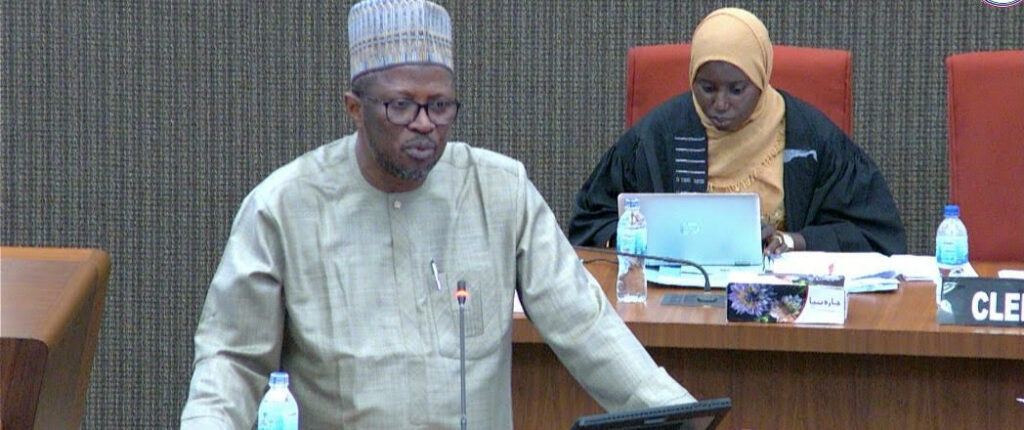“There Is No Tax Increment On Cement From Senegal,” Says Trade Minister

By Ramatoulie Jawo
The Honorable Minister of Trade, Industry, Regional Integration, and Employment, Baboucarr O. Joof, informed National Assembly Members on Wednesday that there has been no increase in taxes on cement imported from Senegal. Instead, he clarified that there is an excise tax on imported bagged cement, regardless of its origin.
These remarks were made during a question and answer session at the National Assembly in response to a query from the National Assembly Member for Janjanbureh, Hon. Omar Jammeh.
Hon. Jammeh mentioned that the announced tax increase on imported cement from Senegal has raised concerns among small-scale importers, who fear the policy will significantly impact their businesses. There are also public worries about potential monopolies and price hikes due to the government’s actions.
He requested the Hon. Minister for Trade, Industry, Regional Integration, and Employment to explain the rationale behind the sudden tax increase on imported cement from Senegal and provide evidence of any market research conducted before implementing this decision.
In his response, the Minister of Trade reiterated that no specific country is being targeted, as such an act would be discriminatory. He emphasized the importance of industrial development for job creation and national development, especially in integrating Gambia’s economy into the global and sub-regional economies.
“Again, our measure does not target any specific country, as that would constitute to discrimination. Considering the low level of industrial sector performance and the benefits associated with industrialization, particularly in the area of employment and technological advancement, this constitutes a compelling reason for a paradigm shift in policy approach to national development, especially within the context of integrating our economy into the global economy and in particular in the sub-regional economy,” he said.
The Trade Minister highlighted the need for strategic policies that support industrial promotion, including protection measures like higher tariffs on imports. This approach aims to give local manufacturing firms a competitive advantage, enabling them to grow, increase productivity, and benefit from economies of scale.
“This protection can come in various forms, such as a moratorium or the introduction of higher tariffs for protection on imports. This is to give a market advantage to local manufacturing firms and allow them to grow and increase productivity, so that we can benefit from economies of scale.
He pointed out that the Gambia’s economy is highly dependent on trade, with imports and exports significantly contributing to economic growth. However, the trade balance has traditionally been a deficit due to low production levels.
“To further promote Gambia-ECOWAS trade, the country started implementing the ECOWAS trade liberalization scheme (ETLS) in 2006 and has so far registered over 30 manufacturing enterprises in the Scheme. As part of this scheme, Gambian producers can freely, without duties, sell to other ECOWAS countries just as they are freely able to sell in The Gambia,” he said.
He stated that the ETLS allows Gambian producers to access sub-regional markets without the concern of tariffs, which are a significant obstacle to international trade.
“As a result of the ETLS, Senegalese enterprises have penetrated the Gambian market, and imports from Senegal continue to rise every year.
He noted that Senegalese imports have been steadily increasing, from around D774 million in 2018 to over D3 billion in 2022, highlighting the strong trade relationship between the two countries.
“This is, however, not surprising given The Gambia’s proximity to Senegal, and the fact that the two countries share many things in common, particularly, cultural and religious values,” he said.
The Minister also cited past studies showing that over 80% of manufacturing units in the Gambia were operating below 50% capacity due to high energy costs, taxation, and limited market space. To address this, the government has imposed an excise tax on imported bagged cement to support local industry growth.
“To spur growth in the industry, the government has decided to support the industry by imposing an excise tax on the importation of bagged cement,” he said.
In a supplementary question, Hon. Jammeh asked about plans to support businesses affected by this policy. The Minister responded that the Ministry is working to connect affected importers with local producers, allowing them to adjust their distribution channels and continue operating.
“This is why we have invited them. We are trying to create a link between them and the local producers so that they can just recalibrate their distribution channels from The Gambia to the consumers in the country. This is going to give them a lifeline, and they will come back,” he said.

